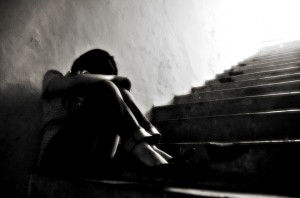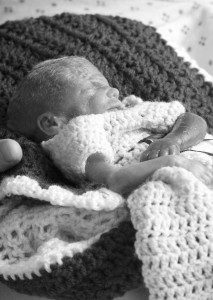Five Types of Guilt After Pregnancy Loss
 You can never anticipate the feelings you will go through following a pregnancy loss. Nothing in life prepares you for it and no one ever thinks it will happen to them. Of all the emotions I went through after each of my three losses, the one that kept surprising me over and over again was the guilty emotions that would surface at unexpected times and in unexpected situations.
You can never anticipate the feelings you will go through following a pregnancy loss. Nothing in life prepares you for it and no one ever thinks it will happen to them. Of all the emotions I went through after each of my three losses, the one that kept surprising me over and over again was the guilty emotions that would surface at unexpected times and in unexpected situations.
Oftentimes the guilt I felt was from some sense of having committed a wrong that was entirely in my imagination or that I had no control over. After speaking with many other women who have experienced similar losses, I know I am not alone in these feelings.
Feeling guilty for some imagined wrong is not unusual following any traumatic event. I hope the following five situations will help others to not feel alone in their own emotions after the loss of a child.
I did something that caused my baby to die
I think almost everyone goes through this. It’s a natural part of coming to terms with the grief. It goes without saying that nothing you did “caused” the death of your child. I remember how guilty I felt as I thought about what I could have done.
Was it something I ate?
Were my pants too tight? (Totally serious)
Is this a punishment for some past sin?
Maybe we shouldn’t have been intimate?
Did that one glass of wine before I knew I was pregnant make a difference?
All these questions and more go through your head. If even just one of them makes sense in your mind it can eat you up inside for months. It’s hard to get past. I remember after my first miscarriage my doctor even went over some of the above questions and told me none of them were true. She did that without prompting from me; she just knew that these were the kinds of things women can come up with and she wanted to put my mind at ease. It didn’t really help at the time, but as more time passed I’m glad she had that conversation with me. Once I could accept my loss as one of those unfortunate events that happen in the lives of many women, I could get past any guilt I had from any of these questions that went through my mind. If you have had similar thoughts, I hope you know that none of these things or anything like it “caused” you baby’s death. In our most rational moments we know that. But many of us aren’t always thinking rationally when dealing with the grief of a pregnancy loss.
I couldn’t look at my child/I flushed the remains
Immediately after a loss we are not in our right mind. Believe me, I look back now at how I was just after each of my three losses and it’s like I’m watching a movie in my head of someone else. With my first miscarriage, we never saw the baby. I was in a room in the triage unit of my hospital’s Labor & Delivery floor, I was in pain from extreme cramping, passing blood clots and tissue, and feeling completely unprepared. An ultrasound showed nothing. I went to the bathroom at one point and passed an extremely large clot. I didn’t even look, I just flushed. I had a very distinct feeling that it was more than a clot, but fear overtook me. I was all alone, I was confused, and it was very late at night.

Our third child, Brigit Ann, was buried in this box with these blankets. I was unable to provide the same for our first child, Casey Marie.
It wasn’t until much later that I felt extreme guilt over my actions. Why didn’t I look? Why didn’t I reach in and save my child’s remains? What is wrong with me? It was hard to get past the guilt. Over time I came to accept that no matter what, God is in control. I depend on Him to make all things right. And I can’t go back and fix things. It’s not a lot of consolation, but it’s some.
I’ve talked to many other women who have had similar experiences. It’s nice to know I am not alone.
Along with this, some women have been unable or unwilling to hold their child after a second or third trimester loss. My first experience led me to have a great desire to hold my son when we lost him at 22 weeks, so my experience is quite different. But many women do not feel that way and may never hold their child. That can lead to a lot of guilt later on when they wish they had taken the opportunity when they had it. If that was your experience, you are not alone. Try to take some time for yourself to spend in quiet prayer, lay your guilt before God, and let Him handle it. Easier said, than done, I’m sure.
I’m so happy right now, but wait …
The very first time I felt any sort of happy/excited/joyful emotions after each of my losses I immediately felt guilty about it. How can I possibly be feeling happy after what I just went through? Whether it is a moment of laughter with a friend, the news that you are expecting again, or any kind of milestone in a subsequent pregnancy, these moments that should be happy have an undertone of sadness to them. And those joyful times then lead to feeling guilty that we felt happy for even a moment.
At first this can be so hard to deal with. Moments of joy can lead to tears. We feel like we don’t have a “right” to be happy. This can be even harder if a subsequent pregnancy happens quickly after a loss. But honestly, sometimes the length of time doesn’t matter at all. Even a year later you can feel guilty for those moments of joy and adulation.
It takes time and it takes many moments of this happening before you can truly feel joy again without that guilt behind it.
“How many children do you have?”
After a pregnancy loss, this can be a hard question to answer. For myself, I found it difficult to answer without feeling some guilt. After my first loss, a miscarriage at 8 weeks, if someone asked me if we had any children yet, I often said no. But a small part of me cringed inside as I answered. This also depended on who was asking the question to an extent. Those close to me knew of our loss, but strangers usually got the “no” answer. If I was meeting someone whom I expected to have continued interaction with, I tended to modify that answer.

Our second child, Zachary Thomas, January 11, 2009.
When we lost our second child, a stillbirth at 22 weeks, I had a harder time telling people that we didn’t have any children. I had held my second child in my arms, looked into his tiny face, felt his hands and feet, how could I tell someone that I had no children. And once I started telling people that yes, we had a son who had died too soon, I then felt guilty for not mentioning my first child.
It was surprisingly freeing to be able to tell someone, even a complete stranger, that I had two childre,n but that they were with God and not here with me. By the time we lost our third baby (a miscarriage at 9-10 weeks), I was very comfortable telling people that we had three children in heaven.
I encourage others to include their children lost too soon as part of their family as much as possible and in whatever way is most comfortable for their family. This is one way to alleviate the guilt that can come along with not including them in the count of your children. How this looks for each family will be different. I happen to be very public about my losses, but I know that isn’t comfortable for everyone. Do what works best for you.
I can’t keep track of pregnancy milestones
I don’t know about you, but I have a few half filled out or completely empty pregnancy journals laying around my house. I have attempted to fill them out, but I’ve been disappointed so many times that I eventually give up. The irrational part of my brain tells me that if I ignore it the pregnancy will be fine, but if I start filling it out, something will happen. Thus I end up with no tangible record of pregnancy milestones for any of my pregnancies.
Other women I have spoken with have confided that they later felt bad about this. There wasn’t anything to share with an older child about the milestones of the pregnancy with him or her. Should we feel guilty for not tracking our pregnancies more? Saving ultrasounds? Noting food cravings and aversions? Describing how we felt, how we slept, when we felt movement? Taking the monthly “belly shots”? I think we need to give ourselves a break and realize that we can only do the best we can do.
For myself, I’ve learned to let go of this one thing because it causes me added stress during pregnancy. I’d love to have the perfect little journals to share with my children when they get older, but not in exchange for my sanity. Sometimes we just have to be okay with how things are for us and not let others (our parents or in-laws or siblings or friends) guilt us into feeling bad for not recording all the “important” moments of a pregnancy.
These are just a few examples of the kind of guilt mothers (and fathers) may deal with following a pregnancy loss. Some of these feelings can stay with us for years. Learning to forgive ourselves, accept the things we can not change, and letting go of the things that don’t matter in the bigger picture can be a very long road. It’s nice to know that you’re not alone in your feelings. And I encourage you, if you are feeling stuck in any of these unhealthy emotions, to lay your feelings out before God in prayer and also to seek the help of a trusted priest through spiritual direction.
Have you felt similar types of guilt at times? How have you learned to live with it or get past it? What else would you add to this list?
This article originally appeared on Catholic Sistas and is used with permission.

